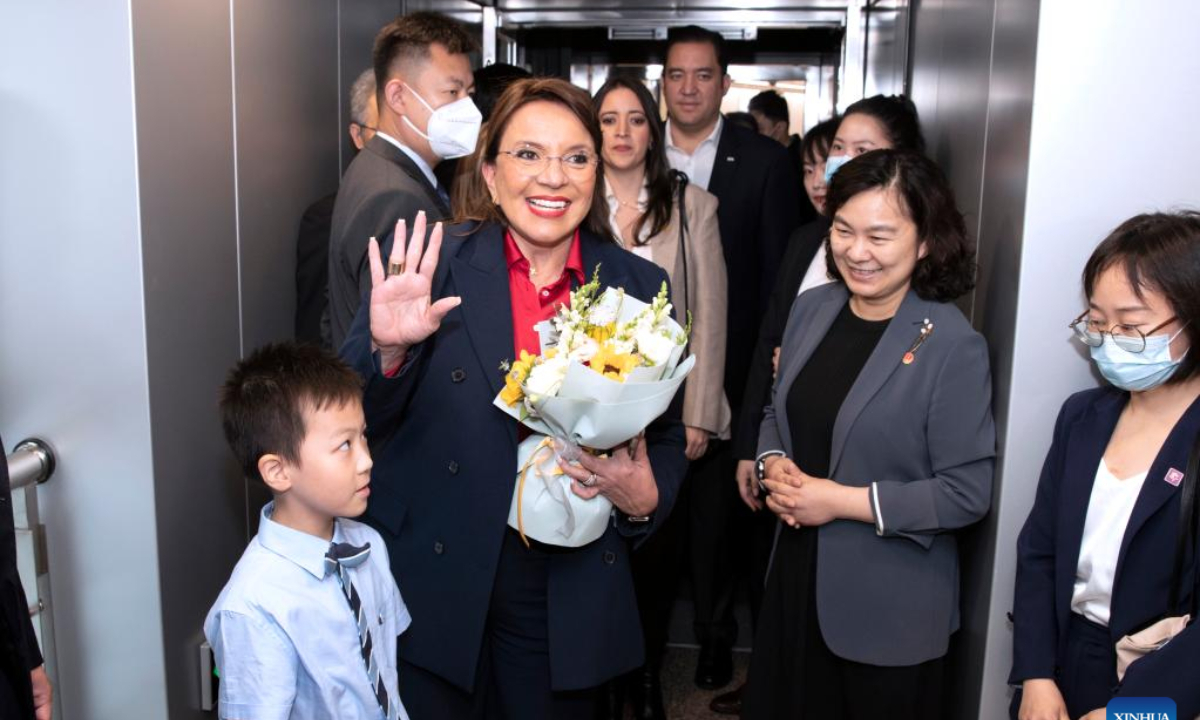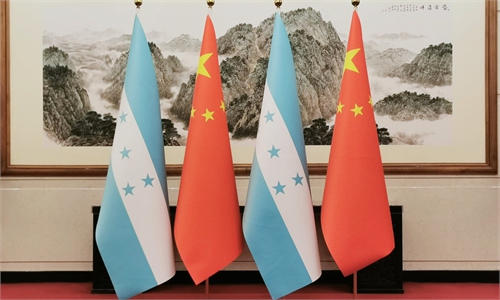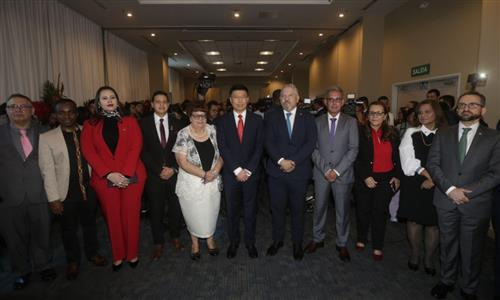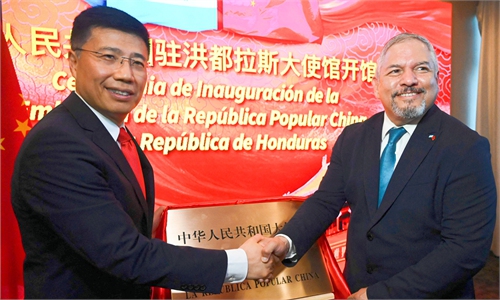China-Honduras ties see new chapter in less than 3 months as Castro kicks off historic state visit
Cooperation in multi-fields to advance, injects positivity into world stability

President of the Republic of Honduras Iris Xiomara Castro Sarmiento arrives in east China's Shanghai June 9, 2023. President of the Republic of Honduras Iris Xiomara Castro Sarmiento arrived in Shanghai on Friday morning, starting her China visit which will run until June 14 at the invitation of Chinese President Xi Jinping. Photo:Xinhua
President of the Republic of Honduras Iris Xiomara Castro Sarmiento kicked off her first visit to China on Friday. The visit came just less than three months after the two countries established diplomatic ties following Honduras' decision to sever the so-called "diplomatic relations" with China's Taiwan region and came soon after the opening of China's Embassy in Honduras.
This rapid improvement of bilateral ties indicates the two sides' sincerity and strong willingness for deeper cooperation and Castro's first visit to China marked a new chapter in ties, experts said, noting that this is greatly important to regional and global development and stability despite the US uses the Taiwan card to contain China and instigate regional tensions and recklessly promotes decoupling from China.
Castro arrived in Shanghai on Friday morning, starting her China visit which will run until June 14 at the invitation of Chinese President Xi Jinping, the Xinhua News Agency reported.
It is the first state visit to China by a Honduran president. The two heads of state will hold a historic meeting to jointly plan for the future development of China-Honduras relations, according to Xinhua.
Hua Chunying, Assistant Minister of Foreign Affairs, received President Castro at the airport. The Chinese side also arranged warm welcome activities for the Honduras delegation, including a traditional Chinese martial arts performance at the Peace Hotel, which was also viewed as the beginning of cultural exchanges between China and Honduras.
Chen Jining, the secretary of the Shanghai Municipal Committee of the Communist Party of China, met with President Castro on Friday. The two sides agreed to enhance cooperation in sectors including economy, trade, culture and tourism under the guidance of the two heads of state.
Chen extended an invitation to Honduras to attend the sixth China International Import Expo (CIIE), which is scheduled to be held in Shanghai in November, in order to let more qualified Honduran products enter the Chinese market.
President Castro said she fully felt the enthusiasm of the Chinese people and the great development achievements China has made. Honduras highly values the development of relations with China and firmly upholds the one-China principle.
The upcoming meeting with Xi will certainly enhance the friendship between the two countries, she said.
In Shanghai, Castro is also expected to visit a Huawei research center and the headquarters of the New Development Bank - a multilateral development bank established by BRICS countries, according to media reports.
Chinese experts and journalists from Honduras reached by the Global Times expressed high expectations for the highly anticipated visit of President Castro and believed the exchanges between the heads of state will set the direction for future China-Honduras relations, and the two countries will reach fruitful agreements in bilateral cooperation in economy, trade, culture and various other fields.
Details on cooperation, including expanding Honduras' agricultural exports to China, China's investment in Honduras and Free Trade Agreement (FTA) negotiations on projects under the Belt and Road Initiative, are also expected to be discussed during the visit, according to experts.
The establishment of diplomatic relations is a new beginning. We hope that with the joint efforts of both sides, China-Honduras relations will get off to a good start, form a batch of tangible results as soon as possible, release more dividends of bilateral ties, and bring more practical results to the people of the two countries, Yuan Dongzhen, deputy director of the Institute of Latin American Studies at the Chinese Academy of Social Sciences, told the Global Times on Friday.
Karl Martinez, a journalist from LTV of Honduras, told the Global Times on Friday that they have many expectations following the president's state visit to China. For example, after seeing China's development, he also hopes that the two countries can become long-term friendly partners. China can help promote Honduras' economic development, not only in terms of exports, but also in the development of Honduras' economy and create more job opportunities for the country, Martinez said.
Douglas Murillo from Canal 8, who attended the event to welcome their President on Friday, told the Global Times that he was honored to report and witness the historic moment.
Stabilizing a turbulent world
On March 26, China and Honduras signed a Joint Communiqué on the Establishment of Diplomatic Relations between the People's Republic of China and the Republic of Honduras.
Less than three months later, China officially inaugurated its embassy in Tegucigalpa, the capital of Honduras, on June 5 local time. Honduras, with a broad strategic vision and firm political will, seized historical opportunities to make the important decision to acknowledge the one-China principle and became the 182nd country to establish diplomatic relations with China, which is highly appreciated by China, Yu Bo, charge d'affaires of the Chinese embassy in Honduras said in his speech at the inauguration ceremony.
China-Honduras relations have developed at a rarely seen speed, highlighting the fact that both sides attach great importance to each other and their strong willingness for deeper relations, Pan Deng, executive director of the Latin American and Caribbean Region Law Center of China University of Political Science and Law, told the Global Times.
Such sincerity and strong willingness to cooperate and the firm and rapid moves to promote cooperation are especially valuable and important these days, given the trend of deglobalization and decoupling pushed by the hegemonic US, experts noted.
"As the biggest developing country in the world, China binds its own peace and development together with the world's prosperity and stability, and always plays a constructive role in sustaining world peace and the improvement of all mankind," Yuan noted.
Central America is right to the south of the US. Many of these countries are very poor, with a few being the least developed in the world. Additionally, the political situation in this region is unstable. A fundamental reason for Honduras deciding to establish ties with China is its eagerness to solve domestic problems such as unemployment and poverty. China has had very successful experience in these fields and will be very helpful, according to experts.
Special Presidential Advisor for the Americas Christopher J. Dodd once traveled to Panama and Honduras in March 17-21, a few days after Honduras announced to cut ties with China's Taiwan region and, instead, established diplomatic ties with China.
This is a latest achievement of China's pragmatic cooperation with Central America in the past years, which at the same time proves the US' declining influence as well as the failure of Taiwan authority's "dollar diplomacy" to maintain so-called diplomatic partners, experts pointed out.
Honduras becomes the latest example of demonstrating the benefits of seeking cooperation rather than confrontation and the two sides' cooperation will contribute to boosting global confidence in the world's stability and development amid the US' hegemonic decoupling push, experts noted.
In the future, the US and the DPP authorities in Taiwan may continue to pressure countries in the region, but it's the general trend that more countries will adopt the correct stance on the international consensus concerning one China, they noted.



